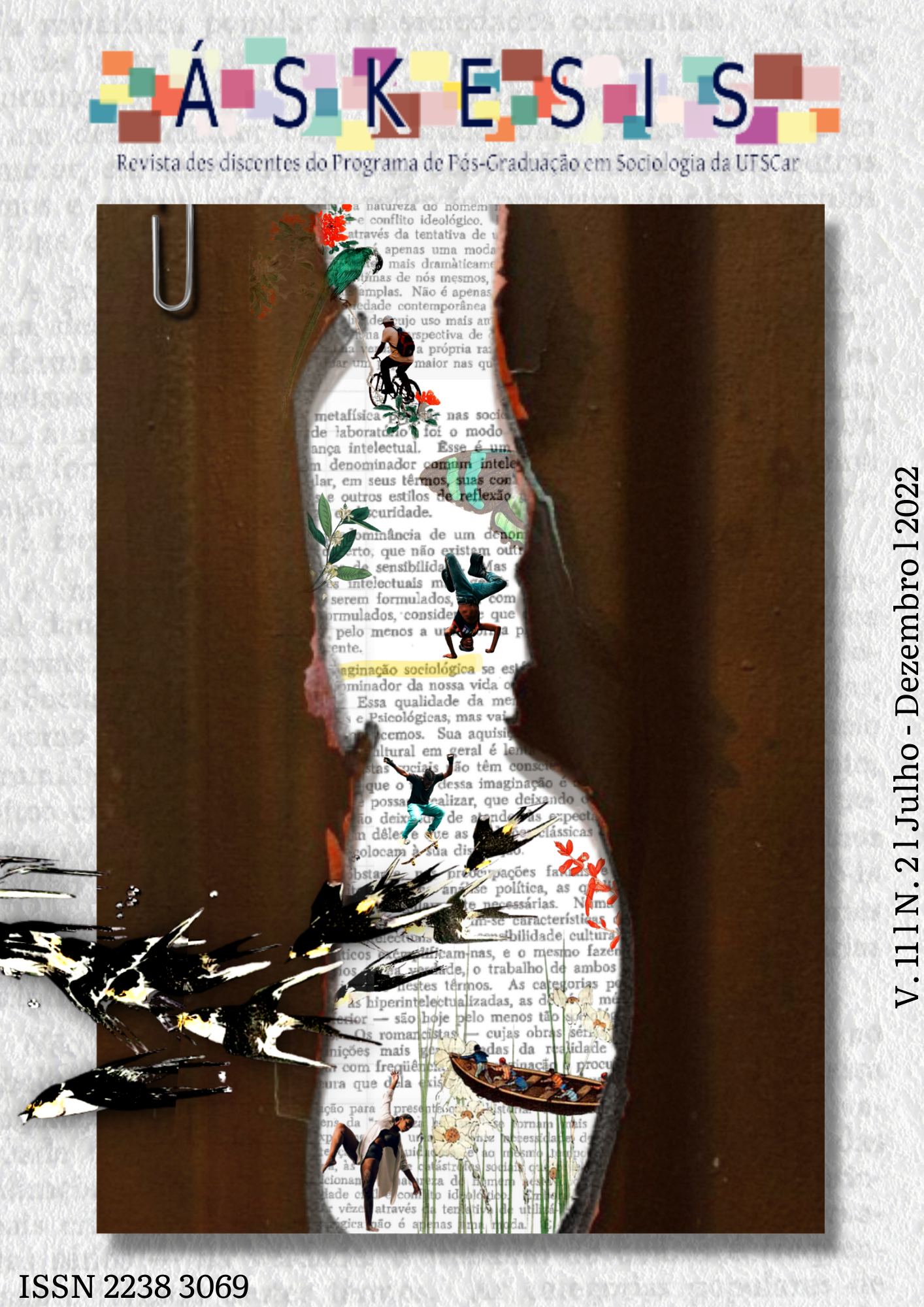Mulheres trans no YouTube:
Quem se torna influenciadora digital?
DOI:
https://doi.org/10.46269/2238-3069.08Palavras-chave:
Mulheres trans, youtubers, Midias sociais, Marcadores sociais da diferençaResumo
O referido artigo visou identificar os perfis de mulheres trans com maior visibilidade e projeção no YouTube, bem como a atenção e contratação de marcas e empresas que as buscam com o objetivo de parcerias. Desde a pesquisa de Ávila (2014) sobre transmasculinidades, o uso e adesão de usuários e usuárias trans na plataforma tem crescido expressivamente. À vista disso, novas questões têm surgido para pensar os usos das mídias digitais por essa população. A partir da crescente profissionalização das plataformas com a produção e a monetização de conteúdos digitais e da aceitação dos/das digitais influencers e youtubers, pretendeu-se refletir os marcadores sociais que impulsionam e/ou dificultam a visibilidade das identidades trans nesse espaço.
Palavras-chave: Mulheres trans; Youtubers; Mídias Sociais; Marcadores sociais da diferença.
Referências
ÁVILA, Simone. FTM, transhomem, homem trans, trans, homem: a emergência de transmasculinidades no Brasil contemporâneo. Florianópolis, 2014. Tese de doutorado. Pós-graduação Interdisciplinar em Ciências Humanas, Universidade Federal de Santa Catarina.
COMSCORE. Comscore Multi-platform, 2014-2017, Brasil. Youtube Insights, jul. 2017. Disponível em: <https://www.thinkwithgoogle.com/intl/pt-br/youtubeinsights/2017/de-play-em-play/>. Acesso em: 11 de novembro de 2019.
CRENSHAW, Kimberle. Desmarginalizando a interseção de raça e sexo: uma critica feminista negra da doutrina jurídica de antidiscriminação. Feminist theory and antiracist politics. University of Chicago Legal Forum. V. 140, p. 139-167, 2002.
DIJCK, J. La cultura de la conectividad. Buenos Aires: Siglo Veintiuno Editores, 2016.
GIDDENS, Anthony. Modernidade e Identidade. Tradução: Plínio Dentzien. Rio de Janeiro: Jorge Zahar Ed, 2002.
MARANI, Vitor Hugo; LARA, Larissa Michelle; SOUZA, Juliano de. O agenciamento do corpo na modernidade reflexiva: notas e excertos a partir de Antony Giddens. Movimento: Revista de Educação Física da UFRGS. Porto Alegre, v. 25, 2019.
MARINHO, Maria Helena. Pesquisa Video Viewers 2017. Think With Google, set. 2017. Disponível em: <https://www.thinkwithgoogle.com/intl/pt-br/advertising-channels/v%C3%ADdeo/pesquisa-video-viewers-2017-cinco-insights-sobre-consumo-de-videos-no-brasil/>. Acesso em: 22 jan. 2020.
MARTINO, Luís Mauro Sá. Teoria das Mídias Digitais: linguagens, ambientes, redes / Luís Mauro Sá Martino. - Petrópolis, RJ: Vozes, 2014.
PELUCIO, Larissa. Marcadores sociais da diferença nas experiências travestis de enfrentamento à aids. Revista Saude e Sociedade. Saude soc. vol.20 no.1 São Paulo jan./mar. 2011.
SAMPAIO, Juliana Vieira; GERMANO, Idilva. Tudo é sempre de muito!?: produção de saúde entre travestis e transexuais. Revista estudos feministas , v. 25, p. 453-471, 2017.
SANTIAGO, Diego Yu. É todo nosso: um relato trans a partir de relatos de pessoas trans no youtube. 130p. 2018. Trabalho de Conclusão do Curso (Jornalismo), Universidade Federal da Bahia, UFBA.
SOUZA, Vernonica Laveli de. Digital influencers: um estudo sociológico sobre o empreendedorismo digital e a cultura da recomendação. Dissertação em Sociologia. Universidade Federal de São Carlos. P. 98. 2019.
Downloads
Publicado
Edição
Seção
Licença
Copyright (c) 2023 Nagel de Oliveira Fagundes

Este trabalho está licenciado sob uma licença Creative Commons Attribution-NonCommercial 4.0 International License.
Procedimentos para o envio dos manuscritos
Ao enviar seu manuscrito o(s) autor(es) está(rão) automaticamente: a) autorizando o processo editorial do manuscrito; b) garantindo de que todos os procedimentos éticos exigidos foram atendidos; c) compartilha os direitos autorais do manuscrito com a revista Áskesis; d) admitindo que houve revisão cuidadosa do texto com relação ao português e à digitação; título, e subtítulo (se houver) em português; resumo na língua do texto, com as mesmas características; palavras-chave inseridas logo abaixo do resumo, além de keywords para o abstract; apresentação dos elementos descritivos das referências utilizadas no texto, que permitam sua identificação individual; observação das normas de publicação para garantir a qualidade e tornar o processo editorial mais ágil.
Ao submeter o manuscrito deve ser informado (no portal SEER) nome, endereço, e-mail e telefone do autor a contatar e dos demais autores. Forma de Apresentação dos Manuscritos O título deverá ser apresentado em português e inglês.
A apresentação dos originais deverá seguir as normas da Revista Áskesis e, quando não contempladas, seguir as normas atualizadas da Associação Brasileira de Normas Técnicas (ABNT). Recomenda-se a consulta principalmente às normas NBR 10.520/02 – Citações em documentos; NBR 6024/03 – Numeração progressiva das seções de um documento; NBR 6023/02 – Referências; NBR 6028/03 – Resumos; NBR 6022/03 –Artigo em publicação periódica científica impressa - Apresentação. Nota: Os resumos que acompanham os documentos devem ser de caráter informativo, apresentando elementos sobre as finalidades, metodologia, resultados e conclusões do estudo.
Figuras, tabelas, quadros, etc., devem ser apresentadas uma em cada página, acompanhadas das respectivas legendas e títulos. As figuras e tabelas não devem exceder 17,5 cm de largura por 23,5 cm de comprimento. Devem ser, preferencialmente, elaboradas no Word/Windows. Não serão aceitas figuras gráficas com cores ou padrões rebuscados que possam ser confundidos entre si, quando da editoração da revista. Se aceito, as figuras e tabelas devem ser enviadas separadamente, via e-mail, para o precesso de diagramação, com suas respectivas legendas explicativas.


